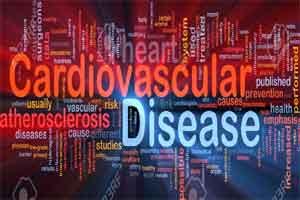- Home
- Editorial
- News
- Practice Guidelines
- Anesthesiology Guidelines
- Cancer Guidelines
- Cardiac Sciences Guidelines
- Critical Care Guidelines
- Dentistry Guidelines
- Dermatology Guidelines
- Diabetes and Endo Guidelines
- Diagnostics Guidelines
- ENT Guidelines
- Featured Practice Guidelines
- Gastroenterology Guidelines
- Geriatrics Guidelines
- Medicine Guidelines
- Nephrology Guidelines
- Neurosciences Guidelines
- Obs and Gynae Guidelines
- Ophthalmology Guidelines
- Orthopaedics Guidelines
- Paediatrics Guidelines
- Psychiatry Guidelines
- Pulmonology Guidelines
- Radiology Guidelines
- Surgery Guidelines
- Urology Guidelines
Smoking Cessation Drug increases Risk of Adverse Cardiovascular Event

Varenicline, one of the most commonly prescribed drugs for helping people quit smoking, may put them at higher risk for a cardiovascular event, according to new research published online in the American Journal of Respiratory and Critical Care Medicine.
In “Cardiovascular and Neuropsychiatric Events Following Varenicline Use for Smoking Cessation,” researchers in Canada report that in an observational, self-controlled trial, patients prescribed varenicline (Chantix in the U.S.; Champix in Canada and Europe) were 34 percent more likely to have an emergency department visit or hospitalization for a cardiovascular event while taking the drug. Among those patients who had not previously experienced a cardiovascular event, the increased incidence was only 12 percent.
The researchers estimated that among all patients, there were 3.95 adverse cardiovascular events per 1,000 varenicline users that could be attributed to the drug. “This is a figure that physicians can quote to their patients,” the authors wrote.
The researchers also found a small increase in emergency department visits and hospitalizations for neuropsychiatric symptoms, but they wrote the findings were not robust and did not appear to be clinically meaningful.
“Previous studies regarding the safety of varenicline have been conflicting and most examined people with relatively similar characteristics and backgrounds in highly controlled settings,” said lead study author Andrea S. Gershon, MD, an associate professor of medicine at the University of Toronto and a scientist at the Institute for Clinical Evaluative Sciences and Sunnybrook Health Sciences Centre in Ontario, Canada. “We wanted to study varenicline among all kinds of people in the real world. “
The researchers analyzed the medical records of 56,851 new users of varenicline between Sept. 2011 and Feb. 2015 living in Ontario. The records were studied from a year prior to the year following the date when varenicline was prescribed. During that time, 4,185 and 4,720 patients experienced one or more cardiovascular or neuropsychiatric events, respectively, that resulted in an ER visit or hospitalization.
Patients served as their own controls. Varenicline is usually taken for 12 weeks. Those weeks were considered the risk interval and were compared to the weeks before initiation of treatment and after treatment should have ended. (The researchers excluded from the control period the six weeks before varenicline was prescribed to avoid biasing results by including patients who had just suffered a cardiovascular event and started varenicline to reduce their risk of another event.)
Cardiovascular events included heart attack, stroke, arrhythmias, unstable angina and peripheral vascular disease, among others. Among neuropsychiatric events, the researchers included depression, anxiety, psychosis, hallucinations, insomnia, and self-harm.
Because the study is observational, it cannot determine cause and effect. The authors said the study was limited by a number of other factors, including not having information about whether the patients quit smoking, whether they took other medications to help quit smoking and whether nicotine withdrawal accounted for some of the neuropsychiatric events reported.
According to the authors, other studies have found that varenicline triples the odds of a person quitting smoking. That long-term health benefit has to be taken into account when considering the potential risks of taking varenicline for 12 weeks, the authors wrote.
“Quitting smoking greatly reduces a person’s chances of developing heart disease and cancer and has many other health benefits,” Dr. Gershon said. “Our findings should not be used to suggest people not take varenicline. The findings should be used to help people make an informed decision about whether they should take varenicline based on accurate information about its risks as well as its benefits.”
Dr. Gershon added that the study finding also suggests that physicians should monitor patients taking varenicline more closely to catch adverse events early if they do occur.

Disclaimer: This site is primarily intended for healthcare professionals. Any content/information on this website does not replace the advice of medical and/or health professionals and should not be construed as medical/diagnostic advice/endorsement or prescription. Use of this site is subject to our terms of use, privacy policy, advertisement policy. © 2020 Minerva Medical Treatment Pvt Ltd